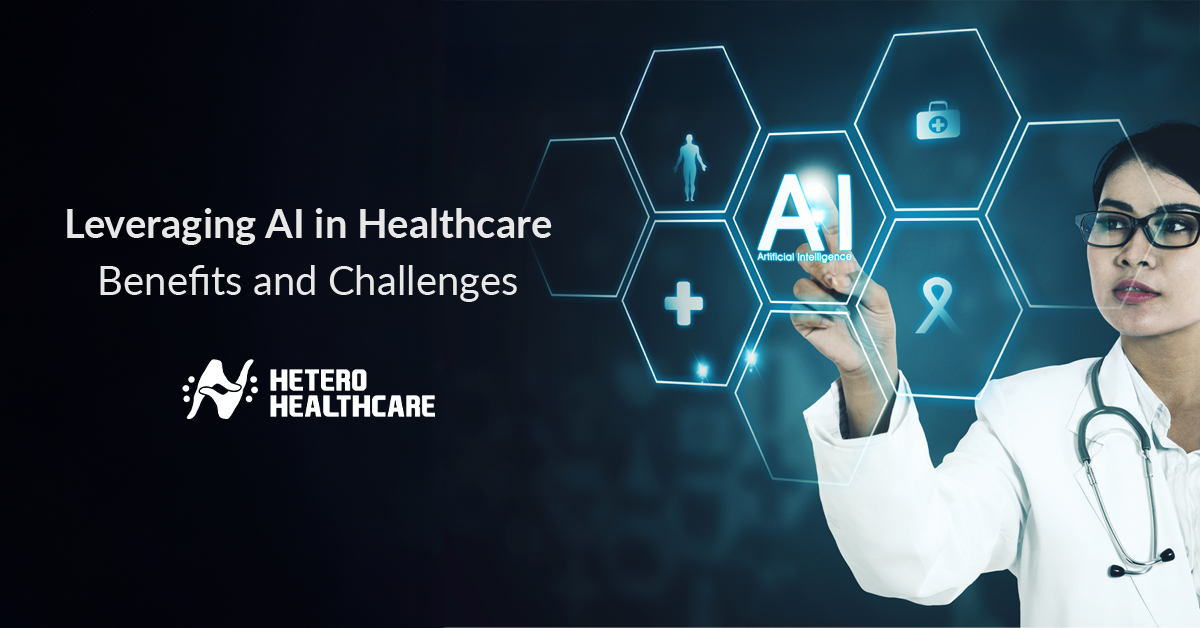Introduction
Artificial Intelligence (AI) is reshaping the healthcare landscape, offering unprecedented opportunities to enhance
diagnostic accuracy, personalize treatments, and streamline operations. From predictive diagnostics to
automated administrative tasks, AI's applications in healthcare are vast and impactful. However, integrating
AI into healthcare systems comes with its own set of challenges, including data privacy, ethical considerations, and
high implementation costs.
In this blog, we dive into the role of AI in healthcare, its significant benefits, the obstacles to its widespread
adoption, and the promising future that lies ahead.
Benefits of AI in Healthcare
- Enhanced Diagnostic Accuracy
- Improved Image Analysis:
AI algorithms excel at analyzing medical images, offering early detection of conditions like
cancer,
cardiovascular diseases, and neurological disorders. For instance, AI-powered tools such as IBM
Watson
Health and Google's DeepMind have achieved high accuracy in interpreting radiology
images.
- Predictive Diagnostics:
Through machine learning, AI can predict the likelihood of diseases by analyzing patterns in large datasets.
This allows healthcare providers to intervene early, potentially saving lives.
- Personalized Treatment Plans
- Tailored Therapies:
AI can analyze genetic data, lifestyle factors, and patient history to craft personalized treatment plans,
ensuring higher treatment efficacy and better patient outcomes.
- Accelerated Drug Discovery:
AI simplifies the drug discovery process by sifting through massive biological datasets to identify
promising drug candidates quickly and cost-effectively.
- Operational Efficiency
- Automated Administrative Tasks:
AI can automate repetitive tasks such as appointment scheduling, billing, and patient record management,
freeing healthcare professionals to focus on patient care.
- Predictive Analytics for Resource Management:
AI tools can predict patient inflow and optimize resource allocation, ensuring better management of hospital
resources and improving patient flow.
- Enhanced Patient Engagement
- Virtual Health Assistants:
AI-powered chatbots offer instant responses to health-related queries, schedule appointments, and send
medication reminders, enhancing patient engagement.
- Remote Monitoring:
Through wearable devices and mobile apps, AI enables real-time health monitoring, providing actionable
insights and timely alerts to patients and healthcare providers.
Challenges of AI in Healthcare
- Data Privacy and Security
- Sensitive Data Handling:
The extensive use of AI involves handling sensitive patient data, raising concerns about data privacy and
compliance with regulations like HIPAA. Robust security protocols are essential to prevent data breaches.
- Cybersecurity Threats:
AI systems can be vulnerable to cyber-attacks. Ensuring cybersecurity through advanced encryption and
monitoring systems is critical.
- Integration with Existing Systems
- Compatibility Issues:
Integrating AI with existing healthcare systems, such as EHRs (Electronic Health Records), poses significant
challenges due to compatibility and data interoperability issues.
- Training and Adoption:
Healthcare professionals need adequate training to leverage AI tools effectively. Resistance to change and
unfamiliarity with AI technology can hinder its adoption.
- Ethical and Regulatory Concerns
- Bias and Fairness:
AI algorithms can reflect biases present in the training data, leading to unequal healthcare outcomes.
Addressing these biases is essential to ensure fair and equitable care for all patients.
- Regulatory Compliance:
The rapid evolution of AI outpaces existing regulatory frameworks. Establishing comprehensive regulations is
necessary to maintain safety and trust in AI applications.
- Cost and Resource Constraints
- High Implementation Costs:
Implementing AI solutions involves significant investments in software, hardware, and workforce training.
Healthcare organizations, especially those with limited resources, may struggle to adopt AI technologies.
- Ongoing Maintenance:
AI systems require continuous updates and maintenance to stay relevant and effective, demanding substantial
resources and expertise.
Future Outlook for AI in Healthcare
- Continued Innovation
- Advancements in AI Technology:
Technological progress in natural language processing, computer vision, and machine learning will unlock new
possibilities in healthcare.
- Collaboration and Partnerships:
Strategic partnerships between tech companies, healthcare providers, and research institutions will
accelerate the development of AI applications.
- Expanding Access and Equity
- Global Health Impact:
AI has the potential to bridge healthcare gaps in underserved regions by enabling remote diagnostics and
telehealth solutions.
- Reducing Disparities:
Efforts to minimize bias in AI algorithms can promote equitable healthcare outcomes and ensure fair access
to AI-based solutions.
- Emphasis on Human-AI Collaboration
- Complementing Human Expertise:
The future of AI in healthcare lies in augmenting, not replacing healthcare professionals. AI can assist
clinicians in making informed decisions, leading to better patient care.
- Patient-Centric Solutions:
Focusing on personalized care and enhanced patient engagement will be key to successful AI integration in
healthcare.
Conclusion
AI is set to revolutionize healthcare by improving diagnostic accuracy, personalizing treatments, and streamlining
operations. However, addressing challenges like data privacy, ethical concerns, and high implementation costs is
crucial for its successful adoption.
The future of AI in healthcare holds immense promise, with potential breakthroughs in personalized medicine,
predictive diagnostics, and operational efficiencies. By fostering collaboration, innovation, and a focus on equity,
the healthcare industry can harness AI to deliver better patient outcomes and transform the way care is provided.
As AI continues to evolve, staying informed and actively participating in shaping its regulatory framework will be
essential for all healthcare stakeholders. The path forward requires a balanced approach, ensuring that AI enhances
healthcare delivery while addressing its inherent challenges.
